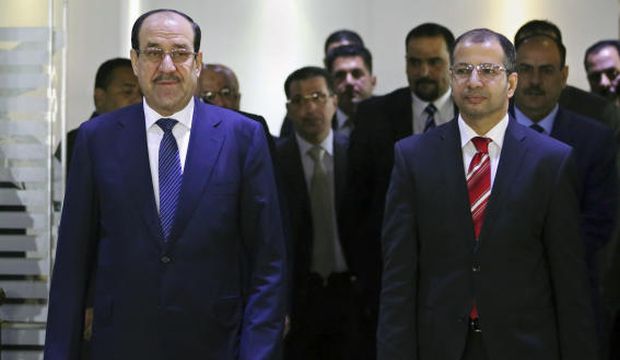
Iraqi Prime Minister Nuri Al-Maliki (L) walks with the Sunni Speaker of Parliament Salim Al-Jabouri during a press conference in Baghdad, Iraq, on Saturday, July 26, 2014. (AP Photo/Hadi Mizban)
Baghdad, Asharq Al-Awsat—Iraq’s most senior Shi’ite cleric called on the country’s politicians to form a national unity government on Friday, as fears grew of cracks in the Shi’ite-led National Alliance, the largest parliamentary bloc in the country, over the weekend.
The call from Ayatollah Ali Al-Sistani was issued by one of his representatives, Ahmed Al-Safi, during a Friday sermon. It comes as Iraqi Prime Minister Nuri Al-Maliki continues unsuccessfully to secure a third term in office, leaving Iraqi politics deadlocked as Baghdad struggles to cope with the advance of the Islamic State of Iraq and Syria (ISIS) and its allies across western and northern Iraq.
Maliki’s movement, the State of Law coalition, came first in Iraq’s parliamentary elections in April, but fell short of a majority. State of Law continues to insist that Maliki be nominated for a third term as prime minister, despite calls from fellow Shi’a parties in the National Alliance to nominate a different candidate.
Sistani’s call is seen as likely to put growing pressure on the embattled Maliki and his partners in the alliance—Moqtada Al-Sadr’s Sadrist Movement, and Ammar Al-Hakim’s Islamic Supreme Council of Iraq (ISCI)—to end the political deadlock.
Shi’ite cleric and academic Abdul Husayn Al-Saadi told Asharq Al-Awsat that Sistani’s call was another appeal to Maliki to reconsider his position.
He said: “Assurances by the religious authority around two months ago of the importance of giving priority to the higher national interest . . . were a clear message to those parties who thought they had the constitutional right [a reference to the State of Law coalition] to have their candidate appointed as prime minister.”
“If issues were resolved in this manner, leader of the Iraqiya List Iyad Allawi would have had that same right in 2010, but the issue of national consensus prevented that,” he said.
Although Allawi’s bloc won the largest number of seats in the last parliamentary election, Iraq’s Supreme Court ruled that Maliki, as the incumbent premier, would be given the first chance to form a government, leading to accusations that Maliki had put pressure on the body.
Saadi added that Maliki’s continued insistence on staying in power risked splitting the National Alliance.
He said: “The situation of Maliki now is more difficult because he is part of a wider alliance which represents the Shi’ite establishment, and despite assurances that this establishment will remain intact, available evidence indicates that there may be no Shi’a alliance left should Maliki insist on clinging to power on the pretext of being part of the largest bloc.”
Ibrahim Bahr Al-Uloum, leading figure in the National Alliance and the Muwatin bloc lead by Ammar Al-Hakim’s ISCI, told Asharq Al-Awsat that “the National Alliance has not yet agreed on one candidate for the prime minister’s position despite the insistence by all Shi’a forces and institutions that the National Alliance, and not the State of Law coalition, is the bigger alliance in parliament without question, and that the State of Law coalition is part of this alliance and must adhere to the decisions of its political body.”
One MP, Mahdi Abdul Hafiz, told Asharq Al-Awsat that former prime minister Ibrahim Al-Jaafari had told him that the National Alliance was considering a number of candidates instead of Maliki.
He said: “The National Alliance candidates are Jaafari himself, Adel Abdul Mahdi, Ahmed Chalabi and Tariq Najm, while Maliki insisted he was the only candidate and that he enjoyed the support of political forces and religious authorities.”
Meanwhile, in another obstacle to the formation of a new government, Sunni alliances in Iraq’s parliament say they will not serve in a government led by Maliki, and may boycott the political process altogether if he remains, accusing him of pursuing sectarian policies that have led Iraq to its current crisis.
Mohamed Al-Khalidi, a leading figure in the Mutahidoun bloc led by former parliament speaker Osama Al-Nujaifi, told Asharq Al-Awsat: “Nujaifi is our candidate for the vice-president’s post, but that is linked to a number of important issues, first of which is knowing the identity of the National Alliance’s candidate for the prime minister’s post.”
“In the event that Maliki remains, there is no chance at all for us to stay in the political process,” he added.
He also called for a major overhaul of the political system created after the 2003 US-led invasion, including the decentralization of power away from Baghdad and the creation of autonomous federal regions.
Khalidi said: “These . . . conditions are the basis of our future [political program], even in the event of a new prime minister being in place other than Maliki.”
In response to a question on a Sunni alternative should those conditions not be achieved, Khalidi said: “We will withdraw from the political process and we have an agreement with the Iraqi Forces Alliance [the largest Sunni bloc in parliament] in that regard.”

Trackbacks/Pingbacks